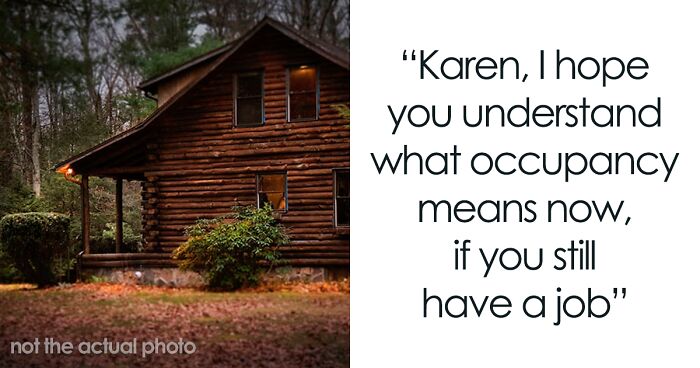
“It Was Clearly Not A Misunderstanding”: Couple Refuse To Pay $200 For Something They Didn’t Do, Make The Company Beg Them To Stop Their Revenge
InterviewWe know well that most companies can be greedy, trying to squeeze every penny for reasons that seem to be made out of thin air (Twitter, under Elon Musk’s management, is a prime example of that).
So, when u/RushxInfinite was charged an extra $200 by a rental company for breaching a rule that urged everyone to look at the legal definition of ‘occupancy,’ this demanded retribution of the pettiest quality – making the company’s Google rating nosedive with a little help from review bombing. Strike them where it hurts, right?
From security deposits to violation of ‘rules’, rental companies are known for their ways of yanking the extra penny
Image credits: Christin Hume (not the actual photo)
A man shared a story of how he got back at the rental company for ripping him off with made-up laws
Image credits: Eneida Nieves (not the actual photo)
Image credits: Torsten Dettlaff (not the actual photo)
Image credits: RushxInfinite
Negative online reviews yield more power than we might think
Image credits: John Schnobrich (not the actual photo)
Since the dawn of Yelp and its contemporaries, there has been much talk about the impact of negative reviews. In 2018, for example, Charter Oak Winery in St. Helena, California, sued Google because of the poor, troll-like reviews on the platform. However, this is not unexpected since 94% of consumers tend to avoid a company because of its negative reviews, according to a recent survey.
Most of you will know that online reviews play a crucial role in our decision-making process when considering our purchases. According to one study by the Pew Research Center, a significant majority (or 82% of American adults) reported that they occasionally or consistently read online reviews before making new purchases. Surprisingly, more than two-thirds of review readers believe that they’re “generally accurate.”
Turns out, a majority of online reviews are not even real
Image credits: Elisa Ventur (not the actual photo)
This, of course, brings a new set of problems because new marketing data suggests that our trust in them may be misplaced – no matter if those horrible 1-star reviews were called for. As Saoud Khalifah, founder and CEO of Fakespot, a site that ferrets out fake reviews, explained to Forbes in 2018: “Companies constantly plant positive reviews of their own products and sully competitors’ products with negative reviews.” Based on Fakespot’s most recent analysis, about 42% of reviews on Amazon are completely bogus.
But why do we put so much trust in bad reviews, even more than the good ones? Well, a single study on the matter indicated that online platforms tend to have a greater number of positive reviews compared to negative ones, resulting in a scarcity of negative reviews that we often associate with valuable feedback. For example, another analysis on Amazon revealed that only 4.8% of reviews with a verified purchase received a one-star rating, whereas a significant majority (or 59%) received a five-star rating. Of course, we’ll take to heart the ones that are in the minority, because that’s how our brains work.
There’s a reason why people pay more attention to poor reviews rather than good ones
Image credits: Jonas Leupe (not the actual photo)
According to Eric Clemons, a Professor of Operations, Information and Decisions at The Wharton School of the University of Pennsylvania, there are two ways – both based on Kahneman and Tversky’s “Prospect Theory” – to explain why people tend to pay more attention to negative reviews, rather than raving ones.
“Imagine that you are looking for a cheap hotel in New York, for one night, so that you can catch a train in the morning,” Clemons explained to Bored Panda in an email. “If you see a review that says ‘best big city hotel, anywhere in the world,’ you are going to ignore it because it simply cannot be true.” However, you’re likely to feel sketchy about a review that promises a “rat-infested hotel in a dark, dirty, crime-infested part of the city, where neither police nor taxis can easily be found,” as well.
Prospect Theory, as Clemons explains, states that people are more concerned with a loss than with a gain of the same size. “The data says that this is often true and seen in people’s behavior.” And that’s exactly why individuals tend to be more cautious and may lean towards avoiding options with negative reviews, influenced by the fear of encountering the problems described in those reviews – even when poor reviews are just a few drops in a sea of good ones, as we noted earlier.
There are ways to spot bogus reviews
Image credits: LinkedIn Sales Solutions (not the actual photo)
Dr. Clemons, one of the founders of Victory Brewing Company in Downingtown, Pennsylvania, is no stranger to negative reception. “Online websites like Rate Beer and Beer Advocate were trusted, possibly because initially the market seemed too small to justify hacking,” he said. “The reviews provided a great deal of detail, so I knew that if a user, who loved the same kinds of beers as I did, gave a beer a great review, I should try it and I knew that if a user who disagreed with me all the time hated a beer, I could discount his review.”
But then, of course, came the fake reviews. “Years ago, I gave the individual who ran Rate Beer at the time advice on how to handle fake reviews:
- If the review comes from someone who has never reviewed before, it may be suspect
- If it provides no detail, or provides only the vaguest detail, is may be suspect
- If it is part of a wave of reviews that are all simultaneous and all almost identical, it may be suspect
- If it is extremely different from other reviews, a true outlier, and it satisfies almost any of the characteristics noted in the three bullets above, it is certainly suspect
“My intervention at Rate Beer was motivated by a massive wave of perfect 5 out of 5 reviews for a beer that was ranged in the 0th percentile,” Clemons explains, “which is an oxymoron. It means that 100% of the beers in the world are better. Clearly, this was a roundoff error, for a beer ranked in the bottom .4% to be among the best beers in the world.”
Review bombing is particularly prominent within the realm of pop culture
Before one of the most hailed video games of the last decade, The Last of Us 2, was released in 2020, many were surprised by the onslaught of negative reviews. The studio behind the game knew that the material can be sort of controversial, but they didn’t expect it to be this bad. At one point, The Last of Us 2 had 1,978 positive user reviews versus 4,758 negative ones on Metacritic (Rotten Tomatoes but for video games).
Giulio Giacomo Cantone, a Research Fellow at the University of Sussex, was fascinated with the case of The Last of Us 2, inspiring him and his colleagues to examine this phenomenon further. “Review bombs,” he explained to Bored Panda in an email, “are self-alimenting, like fires or, sadly, epidemics like Covid-19. I believe that part of this statistical behavior can be explained with a degree of ‘fear of missing out’ (or FOMO). We spotted much less disinformation than we expected.”
What Cantone found out, at least in this case, is that review bombing was inspired by extreme feelings about the developers’ decision to include an LGBTQ+ character in the game (which will also feature in the upcoming season of the TV adaptation of The Last of Us 2). “We found profiles coherent with people feeling genuinely compelled to provide their very extreme opinions about these cultural objects, and about the other people who comment on these before them.”
A prominent instance of ‘review bombing’ occurred in the case of the recently premiered ‘The Little Mermaid’ film
Cantone also pointed out that most people who participated in the review bombing of The Last of Us 2, appear not to be engaged in extreme online debates. However, what inspires them to join the bombardment is a sort of cultural trigger which goes against their political beliefs. The most recent example of a similar case, then, is Disney’s recent live-action remake of The Little Mermaid. When it was announced that the Black actor Halle Bailey will be playing Ariel, the red-haired protagonist of the story, the news was met with a tsunami of negative reviews, forcing The Internet Movie Database (or IMDB) to update its review system.
“Another subtle aspect of review bombing is that bombings always start as acts of deception. Most people don’t really think what they write. Their rational goal is to put down (or, up) the aggregate score of the cultural object,” Cantone explained, noting that “censoring bombings would be a disaster” for review systems such as IMDB or Metacritic.
“In our papers, we proposed some solutions: one of them is just to allow users to rate ratings, and to give more relevance to the opinion users who switched opinions after the release,” he said. An excellent illustration of this concept can be found in the rating system employed by Steam, the leading online video game marketplace. Not only does it allow gamers to rate and review others’ opinions, but it also provides visibility into the amount of time they have invested in playing the game before expressing their views. “My principle is to not restrict participation but instead to incentivize a good use of the platform.”
Some people applauded the way the OP handled being ripped off
However, there were a few that thought OP’s approach was a bit too much
Posting one bad review stating what happened is normal and the company deserves it. But using several made up accounts and/or asking third parties to leave negative reviews is a criminal offense (defamation). Sue the company for what they did but don’t put yourself in a position to be sued for far far far more than 200 dollars.
Suing the company is a nice idea - but it’s also entirely impractical. It’s expensive, and time consuming, far beyond the potential rewards. This is also why the company didn’t sue for defamation.
Load More Replies...Don't assume anyone is spending the night unless you see their car still in the driveway in the morning.
Technically, a restaurant has a posted occupancy limit (for fire/building code) which limits how many people in the building at any one point. So in that sense, yes they were occupants. But that code is for commercial properties, not residential. Lady is crazy to stick to it, unless there were explicit rules of "no house parties" or something like that.
Posting one bad review stating what happened is normal and the company deserves it. But using several made up accounts and/or asking third parties to leave negative reviews is a criminal offense (defamation). Sue the company for what they did but don’t put yourself in a position to be sued for far far far more than 200 dollars.
Suing the company is a nice idea - but it’s also entirely impractical. It’s expensive, and time consuming, far beyond the potential rewards. This is also why the company didn’t sue for defamation.
Load More Replies...Don't assume anyone is spending the night unless you see their car still in the driveway in the morning.
Technically, a restaurant has a posted occupancy limit (for fire/building code) which limits how many people in the building at any one point. So in that sense, yes they were occupants. But that code is for commercial properties, not residential. Lady is crazy to stick to it, unless there were explicit rules of "no house parties" or something like that.

 Dark Mode
Dark Mode 

 No fees, cancel anytime
No fees, cancel anytime 








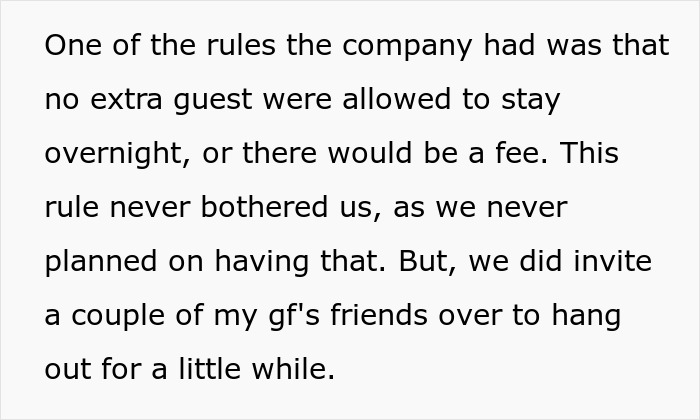
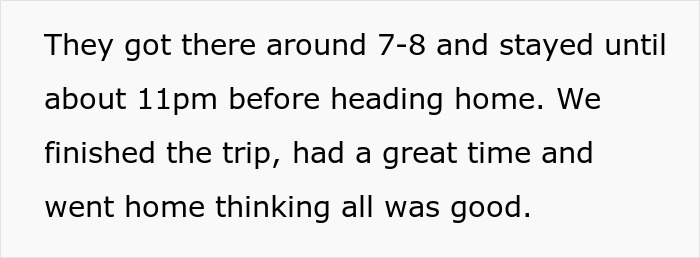 .
.
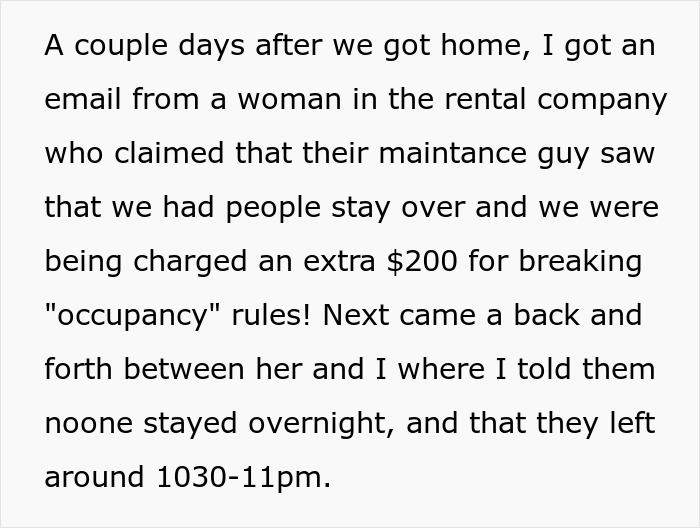
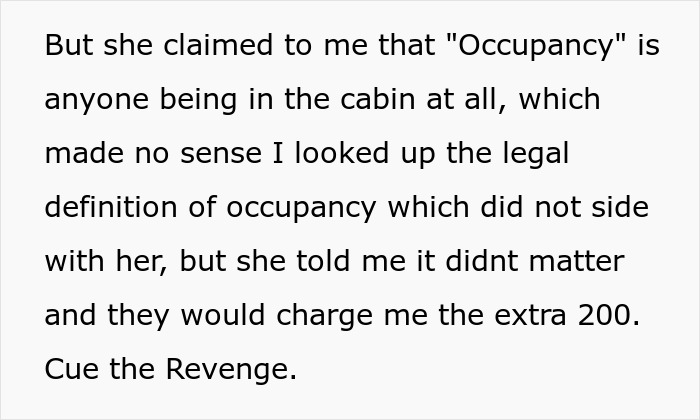
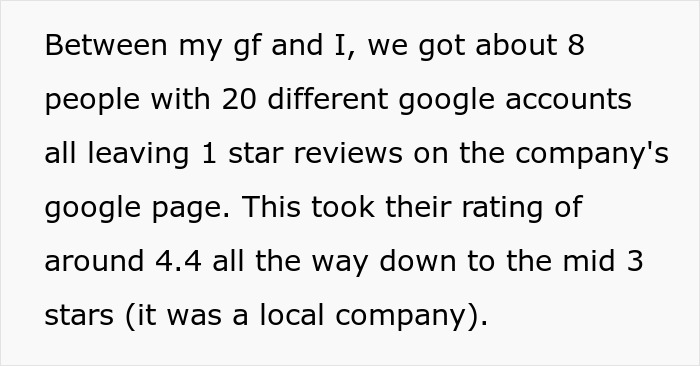

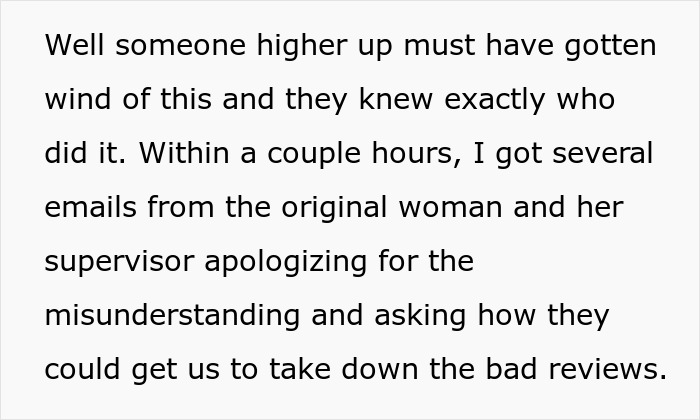
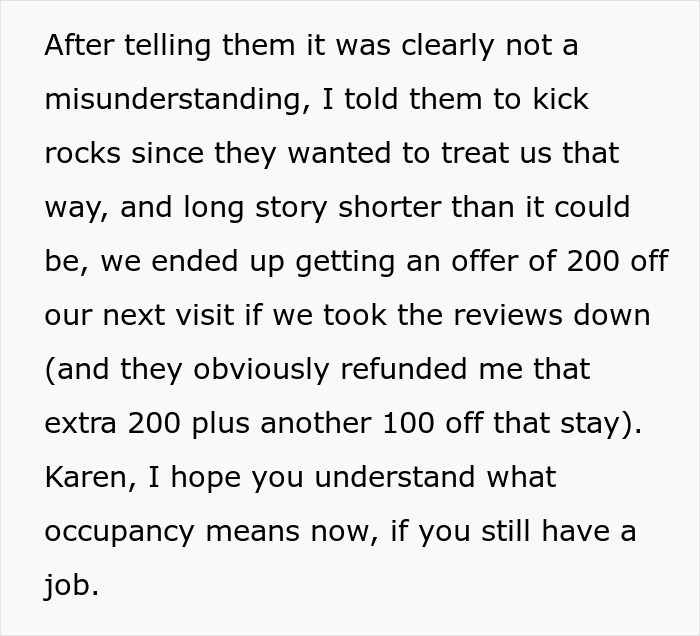




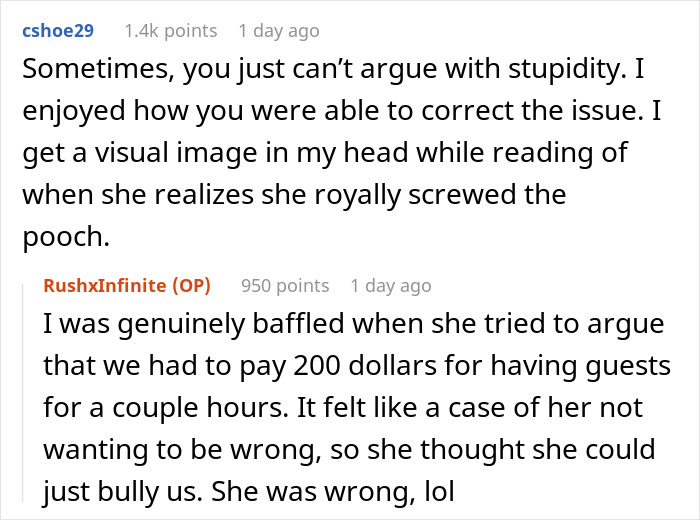
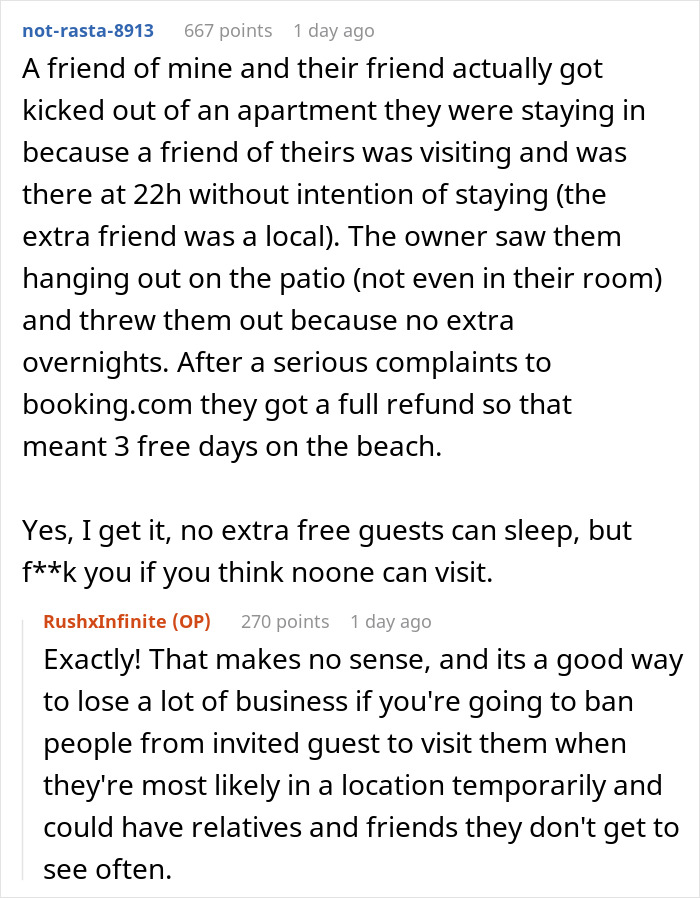

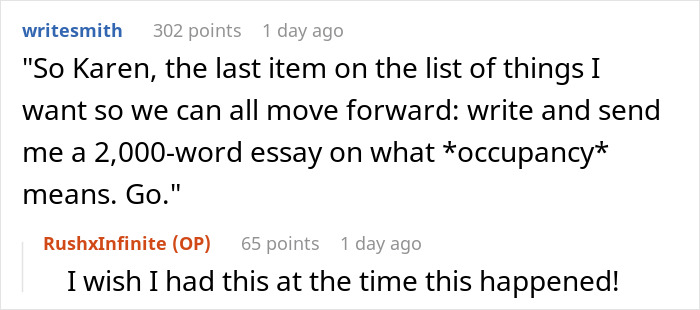
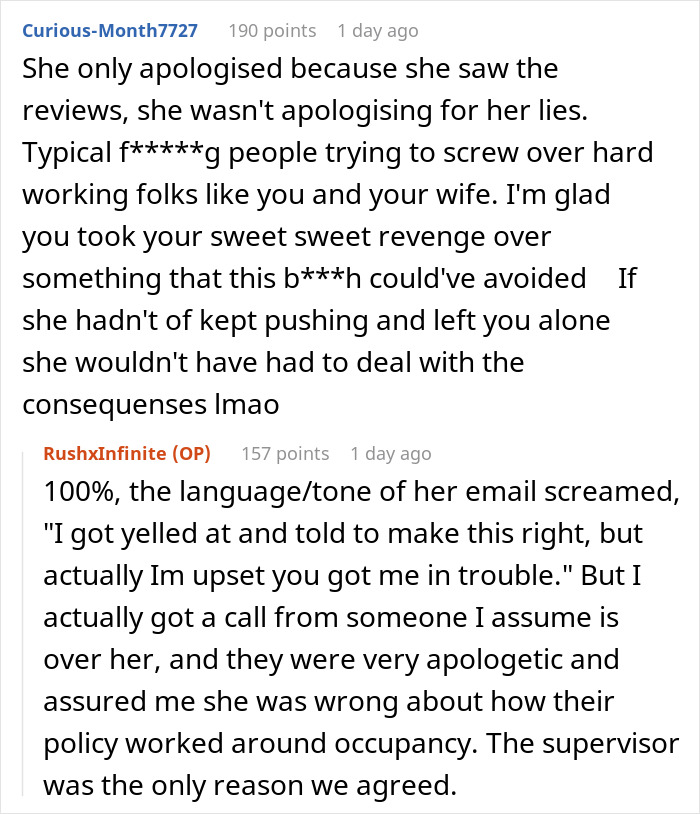
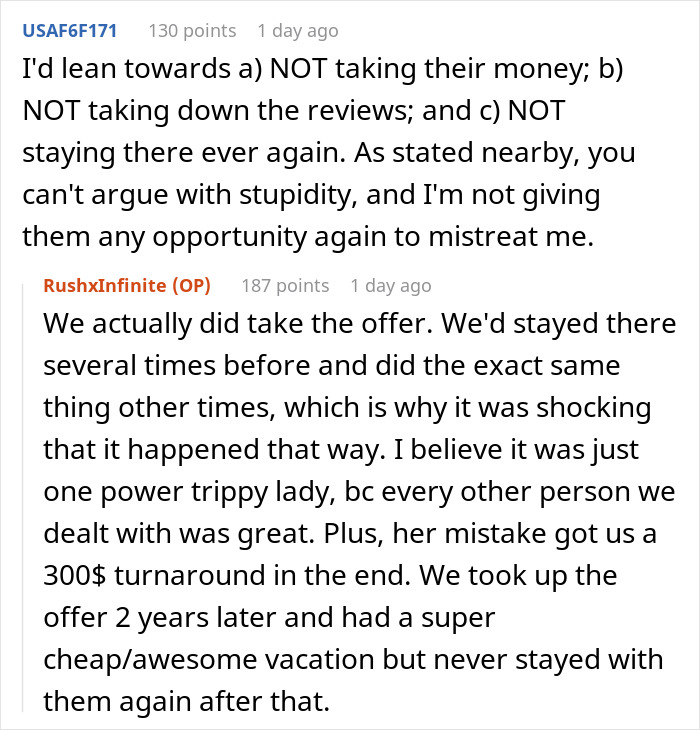
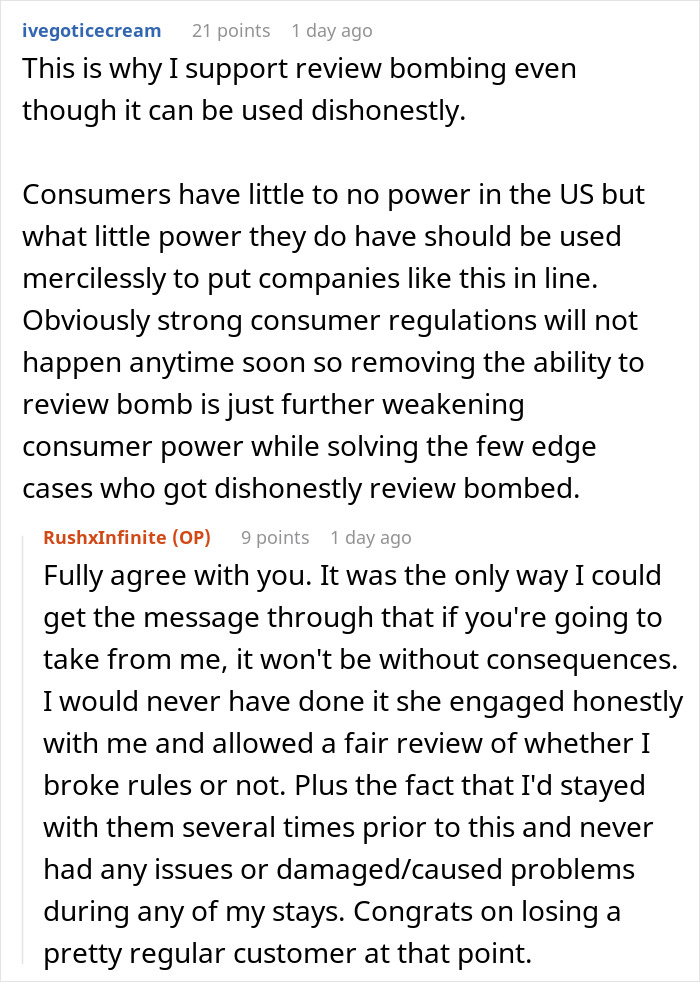
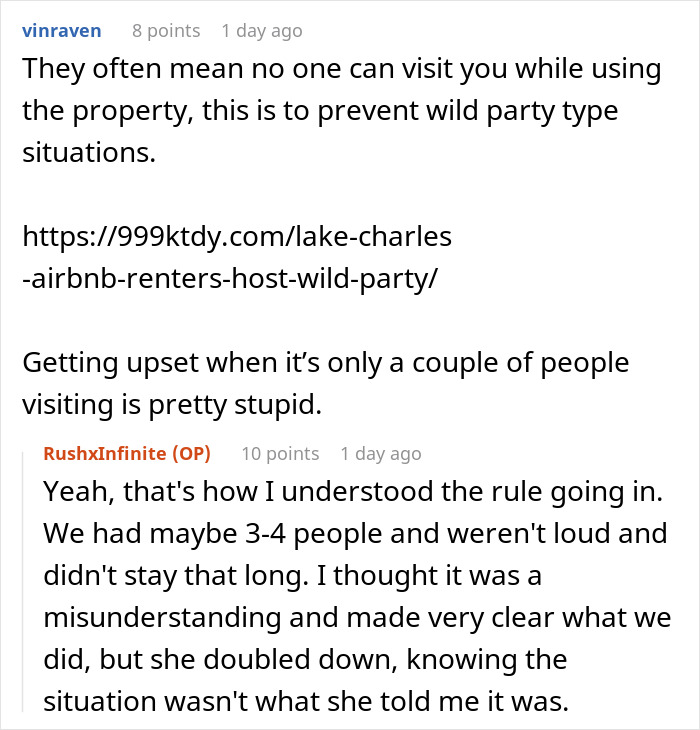
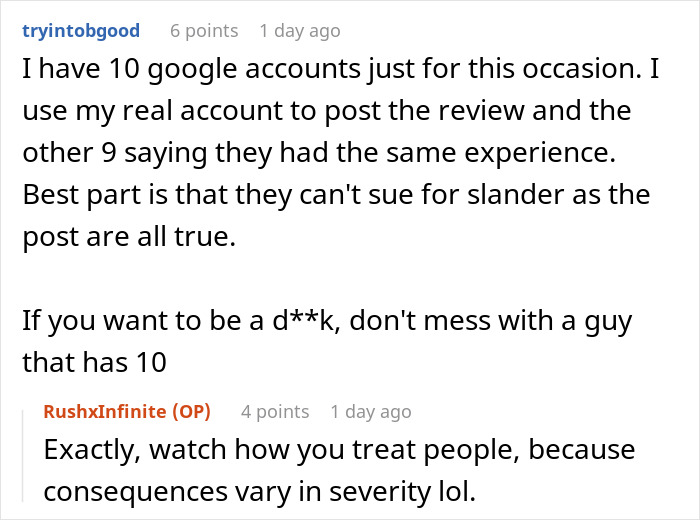
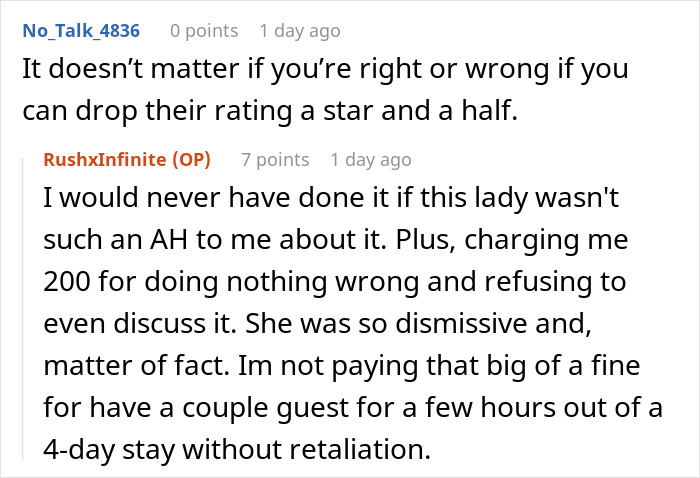
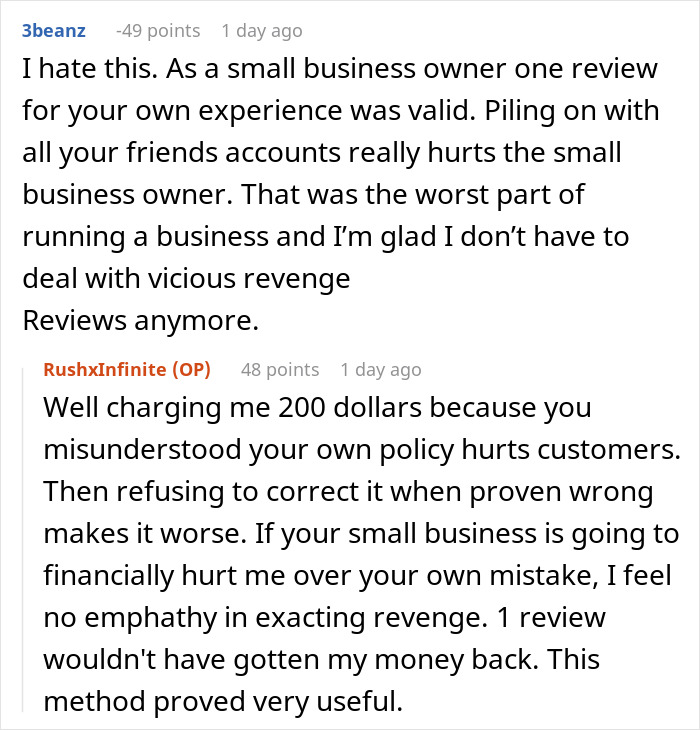












































63
20